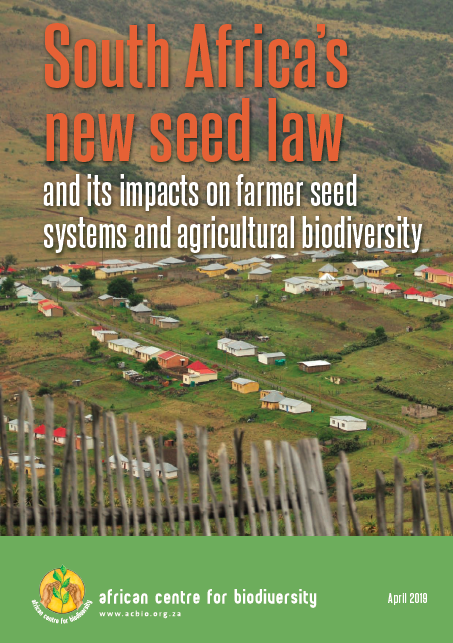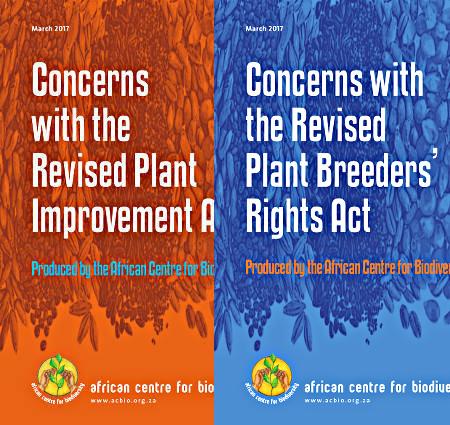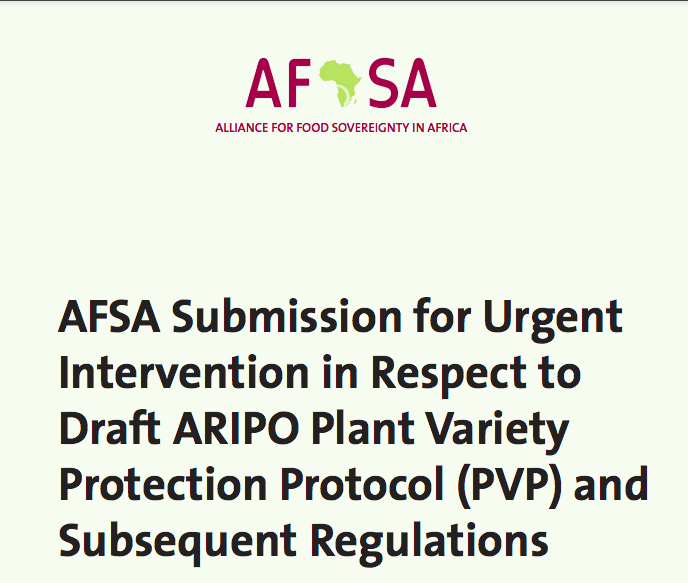Latest Resources

23 April 2019
South Africa’s new seed law and its impacts on farmer seed systems and agricultural biodiversity
In this updated briefing, the African Centre for Biodiversity (ACB) reflects on how the new Plant Improvement Act (PIA) 2018 will further undermine the rights of small-scale farmers while expanding the rights of the corporate agricultural sector, further entrenching its domination. The PIA, together with the new Plant Breeder’s Rights Act (PBR) 2018, was approved […]

17 October 2018
UPOV 1991 and the ITPGRFA: Key issues for farmer managed seed systems in South Africa
The South African government has called upon stakeholders to submit comments and attend stakeholder meetings on the 23rd and 24th October 2018, on the implications of South Africa acceding to the International Union for the Protection of New Varieties of Plants (UPOV 1991) and the International Treaty on Plant Genetic Resources for Food and Agriculture […]

17 September 2018
The SADC PVP Protocol: Blueprint for uptake of UPOV 1991 in Africa
In the recently published discussion paper, ‘The SADC PVP Protocol: Blueprint for uptake of UPOV 1991 in Africa’, Sabrina Masinjila and Mariam Mayet, provide an updated critique on the regional Plant Variety Protection (PVP) system developed under the auspices of the Southern African Development Community (SADC) – the SADC PVP protocol – adopted by the […]

1 September 2017
WEMA Project shrouded in secrecy: open letter to African governments to be accountable to farmers...
The Water Efficient Maize for Africa (WEMA) project promises to develop drought tolerance in maize for the benefit of small holder farmers, but is really a project designed to facilitate the spread of hybrid and genetically modified (GM) maize varieties on the continent. WEMA involves five African countries: Kenya, Mozambique, South Africa, Tanzania and Uganda. […]

10 August 2017
The Water Efficient Maize for Africa Project: Profiteering not Philanthropy
This scoping study aims to appraise, to the best of our knowledge, the current status of the roll-out of a public- private partnership which forms the the Water Efficient Maize for Africa (WEMA) project in five African countries: Kenya, Mozambique, South Africa, Tanzania and Uganda. The partnership is between the African Agricultural Technology Foundation (AATF), […]

27 March 2017
Briefings on the revision of South Africa’s seed laws: Entrenching an unjust and unsustaina...
As we continue to engage and mobilise around the seed policy and legislation revisions, ACB has developed 2 easy-to-read documents outlining the central concerns and possible alternative directions for seed policy to move in South Africa. Despite the public interest to support an equitable seed system, the Plant Improvement and Plant Breeders’ Rights Bills, create […]

28 November 2016
Biosafety aspects of genome-editing techniques
Biosafety TWN Briefing – Biosafety aspects of genome-editing techniques. You can download the paper here.

28 July 2016
ACB Preliminary comments on Draft Regulations Implementing the Arusha Protocol for the Protection...
Draft Regulations for the implementation of the African Regional Intellectual Property Organisation’s (ARIPO’s) Arusha Protocol for the Protection of New Plant Varieties (Arusha Protocol), were considered for adoption in June 2016. The proposed regulations included provisions designed to intimidate and force seed processors, seed suppliers, government certification officers and even farmers’ organisations to police and […]

11 June 2014
AFSA Makes Small Gains for Farmers’ Rights in Draft SADC PVP Protocol
AFSA members participated at a SADC Regional Workshop that took place 13-14 March 2014, in Johannesburg, South Africa. The aim of the workshop was to review the draft SADC PVP Protocol. After marathon, highly contentious and difficult discussions, AFSA members were able to persuade member states to amend key provisions in the draft SADC PVP […]

31 January 2011
Water Efficient Maize for Africa: Pushing GM Crops onto Africa
This paper looks at the Water Efficient Maize for Africa (WEMA) project within the context of the race by massive agribusiness corporations to bring climate change related crops to the market. The first part of the paper explains the WEMA project within this context, outlining the players and the stakes involved. It looks at who […]
